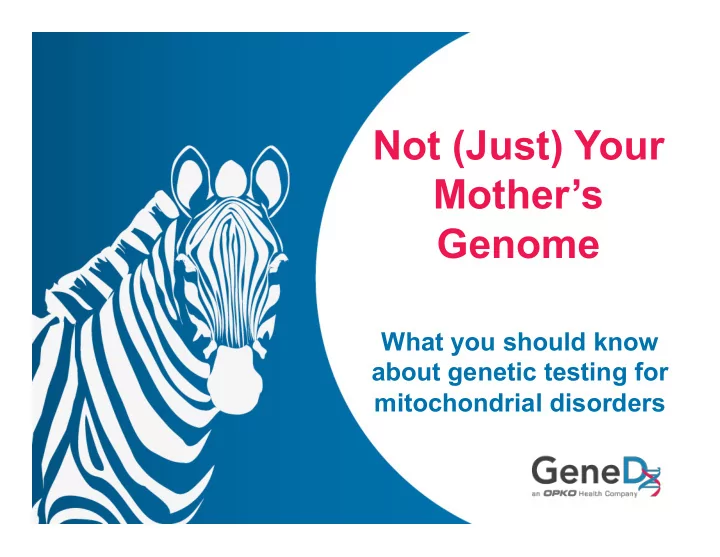

Not (Just) Your Mother’s Genome What you should know about genetic testing for mitochondrial disorders
Disclosures I am an employee of GeneDx, Inc., a wholly-owned subsidiary of OPKO Health, Inc.
What are Mitochondria? http://www.sciencesource.com/
What are symptoms of Mitochondrial Disorders?
Genetics of Mitochondrial Disorders
Genetics of Mitochondrial Disorders https://www.igenea.com/en/mitochondrial-dna � � Chinnery et al. (2015) EMBO Mol Med 7 (12):1503-12 (PMID: 26612854) �
How are Mitochondrial Disorders Diagnosed?
Genetic Testing for Mitochondrial Disorders – Panel Testing Koopman et al. (2012) N. Engl. J. Med. 366 (12):1132-41 (PMID: 22435372)
Genetic Testing for Mitochondrial Disorders - Whole Exome Sequencing The Exome: Approximately 20,000 Total Genes • What is Whole Exome Sequencing 23% – Sequencing of the ~4,600 Genes protein-coding regions of the human genome 77% ~15,000 genes – Only genetic changes that seem like they’re related to the patient’s symptoms are Not known to cause disease reported Known to be associated with disease
Analysis of Genetic Testing Patient’s Known Variants Symptoms Genes
Variant Interpretation Guidelines Variant of Uncertain Pathogeni Likely Benign Significance Likely c Benign Pathogenic
Which Test is Best for Mitochondrial Disorders? • There is no single best test for all patients who are suspected of having a mitochondrial disorder – It depends on specific symptoms that individual person has
Panel testing vs. Whole Exome Sequencing Panel Testing Whole Exome Sequencing Positive Non- Positive 20% Diagnostic 29% 41% Non- Diagnostic Negative 61% Negative 10% 39% Bai R et al. WES and WMGS for Molecular Diagnosis of Mitochondrial Disorders: Lessons from 865 Cases [Abstract #119 and platform presentation]. Presented at the 2015 UMDF Symposium, June 18, 2015, Washington DC;
Whole Exome Sequencing Results Whole Exome Sequencing Positive WES Cases Positive Mito Genes 29% 38% Non-Mito Non- Genes Diagnostic 56% Negative 61% 10% Other mito pathways 6% 3/2016 GeneDx internal data
Special Considerations with for Mitochondrial Genome Testing Intermediate Low Heteroplasmy High Heteroplasmy Heteroplasmy https://clinicalgate.com/mitochondrial-encephalopathies/ �
Mitochondrial Genome Heteroplasmy • The proportion of mitochondrial genomes that have a variant • Percentage can vary from tissue to tissue • Percentage can vary with age • Threshold effect – Variant must be present at a high enough level in a particular tissue in order to cause clinical symptoms – Threshold percentage can vary by variant
Sample Type and Mitochondrial Genome Testing • Sample type – Heteroplasmy can vary from tissue to tissue – Best to send sample from an affected tissue • Most frequently this is muscle or liver • Very important for patients with specific symptoms
Chronic Progressive External Ophthalmoplegia • CPEO is a symptom that is highly specific for a mitochondrial disorder – Approximately 50% of these patients harbor a large mtDNA deletion that is confined to muscle http://www.reviewofophthalmology.com/article/how-to-spot-dangerous-ptosisthe-sequel
Pearson Syndrome • Infantile onset sideroblastic anemia and pancreas dysfunction – Also associated with mtDNA deletions that are most abundant in blood. Tumino et al. (2011) Am. J. Med. Genet. A 155A (12):3063-6 (PMID: 22012855)
Other sample types for Mitochondrial Genome Testing • Oral rinse and buccal swabs – Similar to blood heteroplasmy for most patients • Skin cells – Most skin cells are cultured and some mitochondrial genome variants are selected against when cultured making them more difficult to detect • Urine epithelial cells – Similar to muscle heteroplasmy – However, DNA quality from urine is extremely poor, so it frequently does not yield results • Hair follicles – Poor DNA quality – Heteroplasmy can vary greatly from follicle to follicle
Limitations of Genetic Testing The scientific knowledge available about the function of all genes in the human genome is incomplete at this time Testing may identify the presence of a variant in an affected individual, but we will not recognize it as the cause of their disease due to insufficient knowledge about the gene and its function Not all types of genetic testing can detect all types of genetic variants known to cause disease (such as repeat expansions, variants not present in exons) For mitochondrial genome variants, as heteroplasmy levels can vary from tissue to tissue, some variants may not be detected in the sample type submitted but still be present in other tissues
Acknowledgements • MitoAction • GeneDx Mitochondrial Testing Team – Dr. Renkui Bai – Dr. Hong Cui – Jaimie Higgs, CGC – Linda Carey, CGC – Katrina Haude, CGC – Robyn Byrne, CGC • Mito Patients and Their Families
Recommend
More recommend